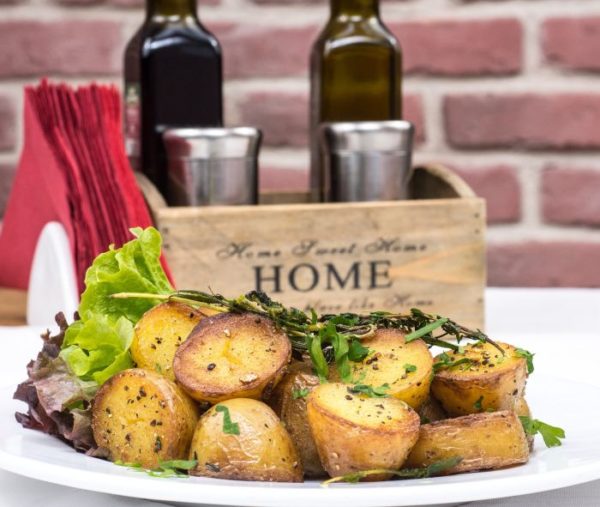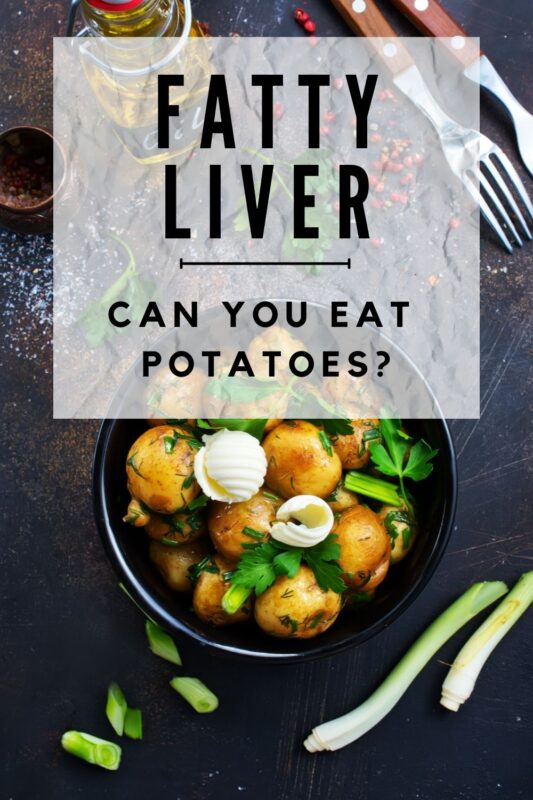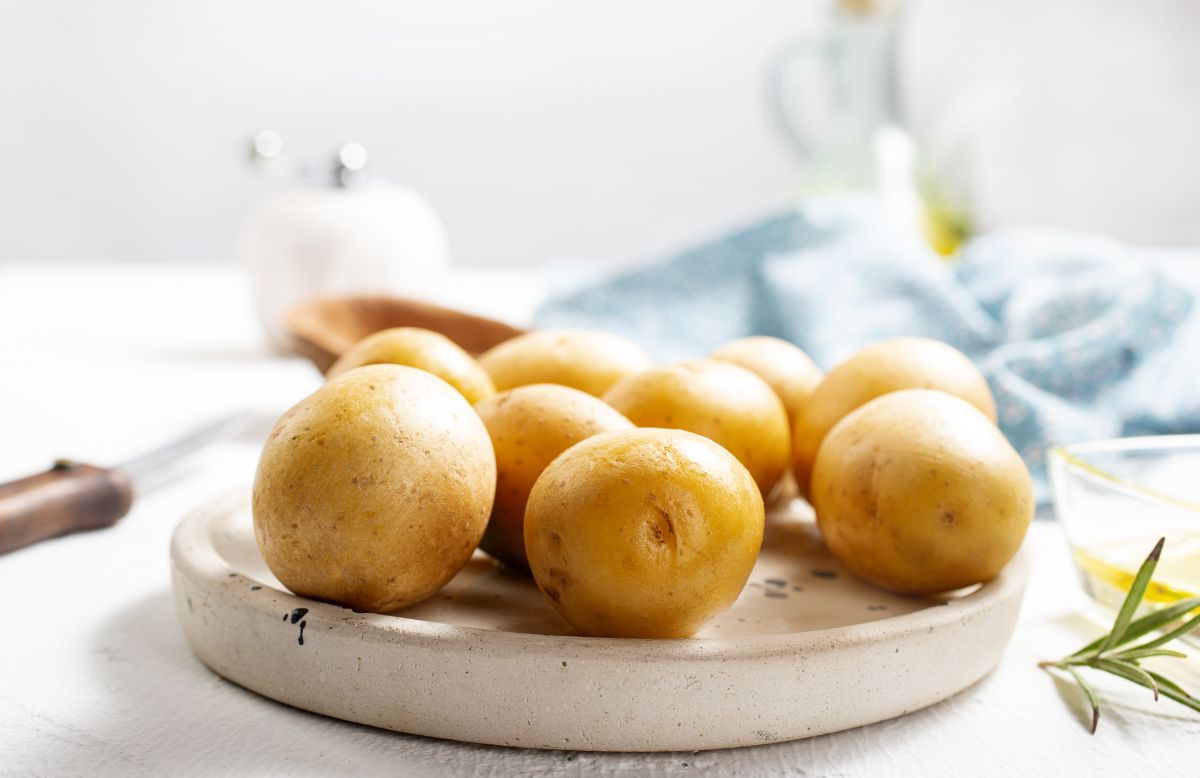Ah, what would life be without potatoes? Well, if you’ve just been diagnosed with a fatty liver, you might soon find the answer to that question first hand because potatoes and NAFLD are not best friends – on the contrary!
Fortunately, you don’t have to say goodbye to potatoes forever and completely take them out from your diet, nor stay away from them for a long time if you do it right.
And today we’ll learn what “do it right” means. We’re going to talk about potatoes and fatty liver in this article and answer the burning question that many of us have: are potatoes good or bad for fatty liver?
We have already touched the “potato / NAFLD” subject a little bit in our article recommending the best diet for a fatty liver, but things are actually a bit more nuanced and it’s better to dedicate an entire article to this topic to help you understand it better.
When you first start learning about the diet and lifestyle adjustments you have to make after being diagnosed with a fatty liver, you are most likely told that you have to cut off fats (and if you are lucky, sugars too).
Although this is indeed what you have to do, it is by no means enough: reducing fat and sugar consumption is just one of the steps that you have to take. Keeping an eye on carbs (aka carbohydrates, which are also sugars) is also extremely important!
Why? Well, because excess carbohydrates turn into fat too! Some even say that carbs are even more dangerous than fat itself, as our body goes the extra mile to synthesize them into fats – and it’s the liver itself that does all this!
And guess which food is also high in carbs? The good ol’ potato! So, this takes us to the following logical question:
Why are potatoes potentially bad for fatty liver?

Please, before anything else, note the use of the word “potentially” above. We’ll get back to this later as potatoes are not inherently bad for the liver. There are healthier ways to cook them and we’ll discuss this a bit later on.
But until then, here’s the bad thing about potatoes:
A single medium sized potato will have anything between 25 to 35 grams of carbs (you can check out all the nutritional values on Wikipedia).
Since a healthy adult should consume about 130 total carbs daily, it means that eating a single medium sized potato would already give you at least 20% of the daily carbs a healthy body needs.
It would be safe to assume that somebody who isn’t healthy (as in having NAFLD) will actually have to eat even fewer carbs each day until they reverse it.
But that’s not all! Things become a bit more complicated, because we eat potatoes cooked in an unhealthy way: frying a potato or even eating boiled potatoes with melted butter and cheese turns them into a caloric bomb that’s extremely unhealthy!
Any gravy we might add on top of it adds extra fats and sugars, making potatoes a pretty bad choice if you’re trying to reverse your fatty liver.
In other words, the way you cook your potatoes can make them really bad for the liver and NAFLD especially. Here are the types of fries you should stay away from:
- French Fries
- Baked potatoes (if you add extra fats or gravy or sugary stuff on top, including cheese)
- Boiled potatoes or mashed potatoes (also if you add extra oils or gravy, melted butter and/or cheese)
However, as I said earlier, a potato is just “potentially” bad for a fatty liver (and for general health).
If you boil or bake a potato and eat it without adding the stuff that makes it unhealthy, it shouldn’t be a huge problem, on the contrary: you’d get a bit of variation into your diet and a pleasant taste!
If you haven’t tried eating potatoes that are just boiled in water or baked without anything added on top, give it a try: you will be surprised to see that the taste is still really good!
Of course, you can add a bit of salt to improve the taste and all sorts of spices to make it taste better (I usually add paprika powder and turmeric, but you can also add oregano, rosemary or basil – basically, any spice you enjoy!)
If you really need to add some sort of a dressing, top your boiled potatoes with a bit of balsamic vinegar or add some low fat yogurt on top (instead of cream/butter).
This is how I personally eat them and I had no problems, having reversed my fatty liver. However, I have an additional piece of advice here.
You should not eat potatoes daily and you should divide potato consumption in two phases: the strict phase, which lasts for one to six months (first months of your diet) should only include potatoes once a week at most – and just one medium potato.
Afterwards, ideally after you have reversed your fatty liver, you can start adding potatoes to your meals: half a potato in a soup or stew, an entire medium sized potato to your meal a few days later – all these are acceptable as long as you don’t eat them too often (and without added fats or sugars).
Try to only eat once or twice per week and keep the portions as small as possible. Always mix with other vegetables or lean meat in order to have variety.
Cooked without added fats and sugars, potatoes still have a high amount of carbs due to the starches inside them, but they also offer a solid nutritional value: they have a bit of fiber and protein, but also larger quantities of iron, potassium, vitamin C and B6, which are beneficial for our bodies.
But if you think you’re not getting enough vitamins as you diet, make sure to read my previous article about the best vitamin supplements for fatty liver.
Are Sweet Potatoes Good for Fatty Liver?

I always thought that it’s wrong to believe that potatoes and sweet potatoes are the same when it comes to nutrition, so I decided to talk about sweet potatoes separately.
I always assumed that since they are “Sweet,” they have a lot more carbs than regular potatoes and therefore should be completely ignored. As a result, I haven’t touched sweet potatoes for months.
But after doing extra research, I found out that Sweet Potatoes are actually very similar to regular potatoes in terms of carbs (around 20% carbs). They also have a lot of vitamins and minerals – in some cases more than regular potatoes.
This means that they shouldn’t be treated as a separate entity from regular potatoes.
They’re basically the same thing – not less healthy, at least. You can check the full nutritional values and more about their health benefits over at Heathline.
But the conclusion would be that yes, you can also eat sweet potatoes if you have a fatty liver. Eat them in moderation and don’t add the stuff we usually add when cooking them like extra sugary things or extra fat.
Basically, treat Sweet Potatoes just as you would treat regular ones. This also means that if you had your portion of regular potatoes this week, you should wait until next week if you feel like having Sweet Potatoes. Don’t treat them as two different things.
Conclusion
Just like with most of the foods out there, potatoes or sweet potatoes and fatty liver follow the same golden rule of thumb: moderation is key.
They are potentially unhealthy if you eat them together with unhealthy foods (or consume then in excess). But the same can be said for spinach or avocado or anything, in the end.
Put a bit of kale in a melting soup of cheese and honey and you’re not eating healthy! You get the idea…
Although potatoes are potentially worse than most vegetables you can eat when on a diet to reverse NAFLD, you can still keep them in your diet and eat them boiled or baked so you don’t have to completely wave them goodbye.

If you want to learn more about various specific foods and fatty liver, I recommend checking out these articles:
- Is oatmeal / porridge good for fatty liver?
- Can you eat noodles if you have NAFLD?
- Can you eat cheese if you have a fatty liver?
Now back to our potatoes: if you have any additional comments or questions, don’t hesitate to let me know in the comments section below.

I was diagnosed with a fatty liver back in 2014 and managed to reverse it by mid-2015. Since then, I’ve been studying it, continuously updating my knowledge with the latest scientific findings and practical approaches to give others the help they need to reverse their condition.
My approach to managing fatty liver is holistic, balancing scientifically-backed information with real-life, practical advice based on personal, direct experience.
I am also the admin of the Fatty Liver Support Group on Facebook and the Fatty Liver Subreddit.


I have always eat to many carbs have fatty liver appreciate your information
Thank You very much – your article addressing potato’s was just what I needed to read as there are so many things I can not eat any more.
SSA in MN
At least I know I can eat potatoes just in moderation
I nuke them to get them cooked, then I use non-fat sour cream and/or EVOO to juice them up. If you don’t put something on them, they will literally choke you when you try to swallow them.
I don’t put anything on them and I can still eat them. But as long as you don’t overdo it, it should be fine.
My son was just diagnosed with NAFLD and me and my wife are so upset because he also has F2 fibroses and we don’t know how to handle this. The doctors have told him that he has to change his lifestyle and diet. My wife is making mash potatoes with turkey dinner and I was wondering if potatoes is good for fatty liver and you answered it.
Thank you,
Sal
is it Okay to eat potatoes cooked in air fryer, with only olive oil rosemary and salt to taste?
They are better than fries, for sure. I wouldn’t overdo it though – have them every now and then, with the minimum amount of added oil.